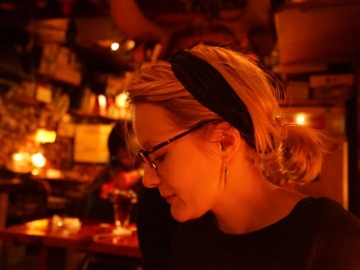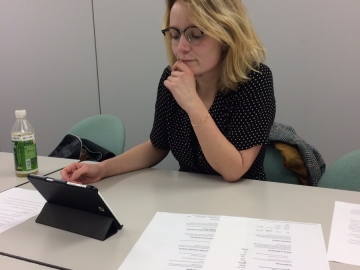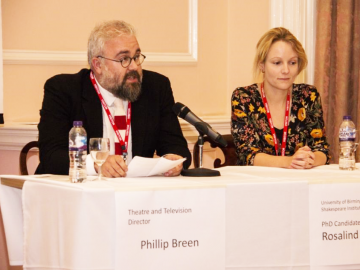New approach to Shakespeare’s plays through unique connections between Japan and the UK
Wed, Feb 28, 2018-
Tags
Shakespeare from the UK to Japan
 William Shakespeare is one of the greatest playwrights to have transcended national barriers and is still recognized today as one of the world’s most preeminent dramatists. His plays, originally written for a small theater in the UK in the late 16th to early 17th century, are now performed and read more often across more countries than ever before. Even in Japan, the opposite side of Europe, Shakespeare has gained popularity and been studied since the first production of Shakespeare in Japan in 1885 and Shoyo Tsubouchi, a professor at Waseda University, started translating Julius Caesar into Japanese in 1888. Tsubouchi later went on to translate Shakespeare’s complete works.
William Shakespeare is one of the greatest playwrights to have transcended national barriers and is still recognized today as one of the world’s most preeminent dramatists. His plays, originally written for a small theater in the UK in the late 16th to early 17th century, are now performed and read more often across more countries than ever before. Even in Japan, the opposite side of Europe, Shakespeare has gained popularity and been studied since the first production of Shakespeare in Japan in 1885 and Shoyo Tsubouchi, a professor at Waseda University, started translating Julius Caesar into Japanese in 1888. Tsubouchi later went on to translate Shakespeare’s complete works.
Rosalind Fielding, a doctoral researcher at Waseda University, grew up with a keen interest in drama and has been dedicated to studying Japanese Shakespeare such as Tsubouchi. Born in Manchester, her interest in drama began at very young age. “I was 12 years old when I saw my first Shakespearean play at school. At the time, I didn’t find it particularly interesting but as I grew up, I realized the depth of his plays.” Fielding also had a passion for Japanese culture, including film and fashion. It was so different from the world she knew, and so as an undergraduate, she decided to major in Japanese studies.
The turning point for Fielding arrived when she started preparing for her undergraduate thesis. “I wanted to combine my two passions for the thesis.” Even after graduating, she decided to continue studying Shakespeare in Japan and enrolled at the University of Manchester to obtain her Master’s degree. The title of her dissertation was “Re-playing Identity/Modernity: Shakespeare and the Invention of Tradition in Meiji and Contemporary Japan,” and focused on the kind of influence Shakespeare’s plays had in Japan. After successfully completing the course, she started working at Shakespeare’s Globe Theatre in London, but she resolved to continue her research and returned to the academic field, enrolling in a PhD program at the University of Birmingham, which is internationally renowned for its knowledge on Shakespeare through their Shakespeare Institute.
Waseda University: the ideal environment to study Shakespeare in Japan
 In 2016, the University of Birmingham and Waseda University signed a collaboration agreement on research into the works of Shakespeare, greatly boosting her research. “It was definitely fortunate for me. I became a research associate at Waseda University as part of this collaboration project, which allowed me to use their incredible resources.” From the myriad of resources available at Waseda University’s Enpaku, officially the Tsubouchi Memorial Theatre Museum, proved to be most valuable for her research. Enpaku has a vast collection of resources on Shakespeare in Japan, most of which are not available in the UK. Tsubouchi’s translation notes are one such resource, along with various Japanese theater magazines. “The collection at Waseda University is so extensive and fascinating that I have to manage my time carefully.” Through seminars on literature, media and other such topics, Fielding also met a number of Waseda University researchers who greatly broadened her perspective and offered new insights. “Waseda’s interdisciplinary atmosphere allows me to cover a broad scope of knowledge.” Through the connection with Waseda University, Fielding is now working with Professor Tetsuhito Motoyama of the Faculty of Law, on producing a translation of contemporary adaptations of Shakespeare in Japan.
In 2016, the University of Birmingham and Waseda University signed a collaboration agreement on research into the works of Shakespeare, greatly boosting her research. “It was definitely fortunate for me. I became a research associate at Waseda University as part of this collaboration project, which allowed me to use their incredible resources.” From the myriad of resources available at Waseda University’s Enpaku, officially the Tsubouchi Memorial Theatre Museum, proved to be most valuable for her research. Enpaku has a vast collection of resources on Shakespeare in Japan, most of which are not available in the UK. Tsubouchi’s translation notes are one such resource, along with various Japanese theater magazines. “The collection at Waseda University is so extensive and fascinating that I have to manage my time carefully.” Through seminars on literature, media and other such topics, Fielding also met a number of Waseda University researchers who greatly broadened her perspective and offered new insights. “Waseda’s interdisciplinary atmosphere allows me to cover a broad scope of knowledge.” Through the connection with Waseda University, Fielding is now working with Professor Tetsuhito Motoyama of the Faculty of Law, on producing a translation of contemporary adaptations of Shakespeare in Japan.
Waseda University’s International Scholar Service (ISS) has also been beneficial in aiding her research by giving her access to Waseda University’s research facilities, including the library. From the variety of services offered, she particularly appreciated their assistance in securing her residence status. In order to attend a symposium in the UK, Fielding was required to extend her visa, but the application was not properly processed and unfortunately caused problems with her passport and residence status. “I was in Japan on a working holiday visa and if this visa expired, I would have had to travel back and forth between the UK and Japan every 90 days. So, I went to ISS for some advice. The staff helped me apply for a Certificate of Eligibility, which I took to the Embassy of Japan when I was back in the UK over Christmas. They were extremely helpful in getting the documents all sorted out.” Fielding expressed her profound gratitude for ISS in supporting her as she carried out her research in Japan.
Enriching the future of Shakespeare plays around the world
 In October 2017, Waseda University and the University of Birmingham jointly held the Ninagawa Shakespeare Memorial Symposium at the Embassy of Japan in the UK as part of their collaboration. “It was a memorable event with an impressive lineup of panelists and participants from both countries, including my advisor and Director of the Shakespeare Institute, Professor Michael Dobson; and Ryuichi Kodama, Vice Director of the Tsubouchi Memorial Theatre Museum and professor at Waseda University.” The Ninagawa Company was also present at the symposium to discuss how the Ninagawa production affected the UK theater world with its Japanese cultural interpretation. “I participated in the discussion as well and served as an interpreter for a special guest, Kyozo Nakamura, a Kabuki actor who played the witch in Ninagawa Company’s Macbeth.” Fielding felt it proved to be a highly enriching experience for her research.
In October 2017, Waseda University and the University of Birmingham jointly held the Ninagawa Shakespeare Memorial Symposium at the Embassy of Japan in the UK as part of their collaboration. “It was a memorable event with an impressive lineup of panelists and participants from both countries, including my advisor and Director of the Shakespeare Institute, Professor Michael Dobson; and Ryuichi Kodama, Vice Director of the Tsubouchi Memorial Theatre Museum and professor at Waseda University.” The Ninagawa Company was also present at the symposium to discuss how the Ninagawa production affected the UK theater world with its Japanese cultural interpretation. “I participated in the discussion as well and served as an interpreter for a special guest, Kyozo Nakamura, a Kabuki actor who played the witch in Ninagawa Company’s Macbeth.” Fielding felt it proved to be a highly enriching experience for her research.
With tremendous support from ISS and Waseda University, Fielding is now concentrating on writing her PhD thesis centered on post 2000 Shakespeare performance in Japan. Shakespeare has been studied all over the world, so what is it that drives Fielding to continue researching Shakespeare in Japan? “Although there are many people studying Japanese Shakespeare, there are few western researchers who conduct their research in Japanese as well as English. And many of the more recent performances haven’t made it into the discussion yet. I’m particularly interested in work created after the 2011 earthquake.” Fielding, as she expressed ambition for the future theater scene in the UK and Japan, said, “I’d like to update the discussion and encourage more and more artists from both countries to work together to explore Shakespeare’s plays further.”
As for her future career, Fielding has yet to decide whether to return to work in the theater or to remain in the academic field. Either way, her future endeavors will surely aid in promoting interaction between British and Japanese Shakespeare, not only in these two countries but all over the world.
Links














